Dunedin Botanic Garden
Institution Code: DUN
BGCI Member: Yes
ArbNet Accredited: Level III

Main Address:
Dunedin Botanic Garden
Dunedin City Council
P O Box 5045
Dunedin
9058 New Zealand
Telephone: 64 (0)3 477 4000
Fax: 64-(0)3 473 9240
URL: https://dunedinbotanicgarden.co.nz/
Primary Email: botanic@cityofdunedin.com
Malcam Trust Project Green Job
Dunedin Botanic Garden works with the Malcam Trust and employs young people, who have been affected by social problems, to undertake maintenance of the garden grounds through a 6 month training and employment program to provide them with skills and work experience and allow them to contribute to the local community in the future.
Project Green Job provides the opportunity for young people at risk to work in a well established botanic garden and gain practical skills, a sense of achievement and pride in the work they carry out. By participating, these young people gain core skills in grounds maintenance and machinery.
Started in 2009, the project is ongoing.
This video contains more information about the gardens education programme. |
ABOUT
The project offers paid opportunities and training in grounds maintenance to graduates from the Malcam Trust’s Youth at Risk foundation course- which caters for a range of disadvantaged young people, from those who have tough childhoods to those who may have been unemployed for an extended period. These apprentices are considered to be staff and their wages paid via the core funding of the garden, therefore the project can continue unhindered, long–term as there is no need to seek out additional funding.
The Malcam Trust employs and administers a full-time Grounds Supervisor and three trainees. Garden staff oversee the workers and regularly meet with Trust Management and Grounds Supervisor to ensure the project is going according to plan.
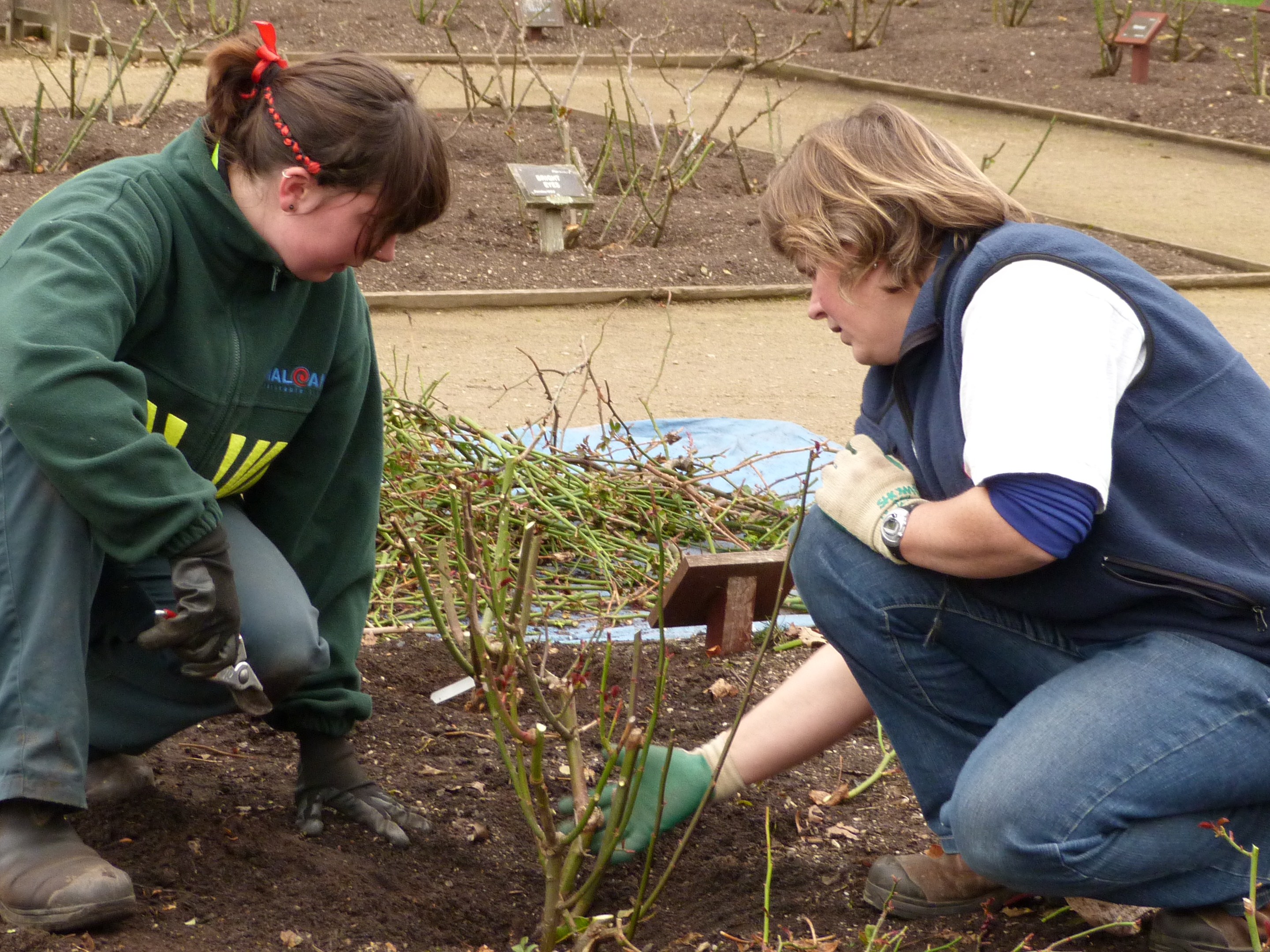 |
Malcam Trust trainee, Lucy Grigg, learning rose pruning from Collection Curator, Linda Hellyer.
|
Young people accepted into each course must have displayed a strong interest in working outside and must have completed the Malcam Trust Foundation Course. Those who excel on the 6 month placement at the garden are then able to apply for one of the trainee positions, to further extend their skills. This prepares interested participants for future employment in grounds maintenance with other organisations and can also provide a step up to applying for the 3 year Apprenticeship in Amenity Horticulture (link) at Dunedin Botanic Garden.
While not all graduate trainees stay in the industry, Project Green Job provides experience and skills which are transferable, such as, turning up to a job on time every day, a positive work ethic, effective communication, motivation and a sense of personal value and self-worth.
Since, these are youth who may not otherwise be exposed to the work of a botanic garden, the fact that the course teaches a wide range of people the value of a botanic garden and plant conservation is another valuable benefit. This knowledge will often be transferred to their friends and family providing wider learning experience to the community.
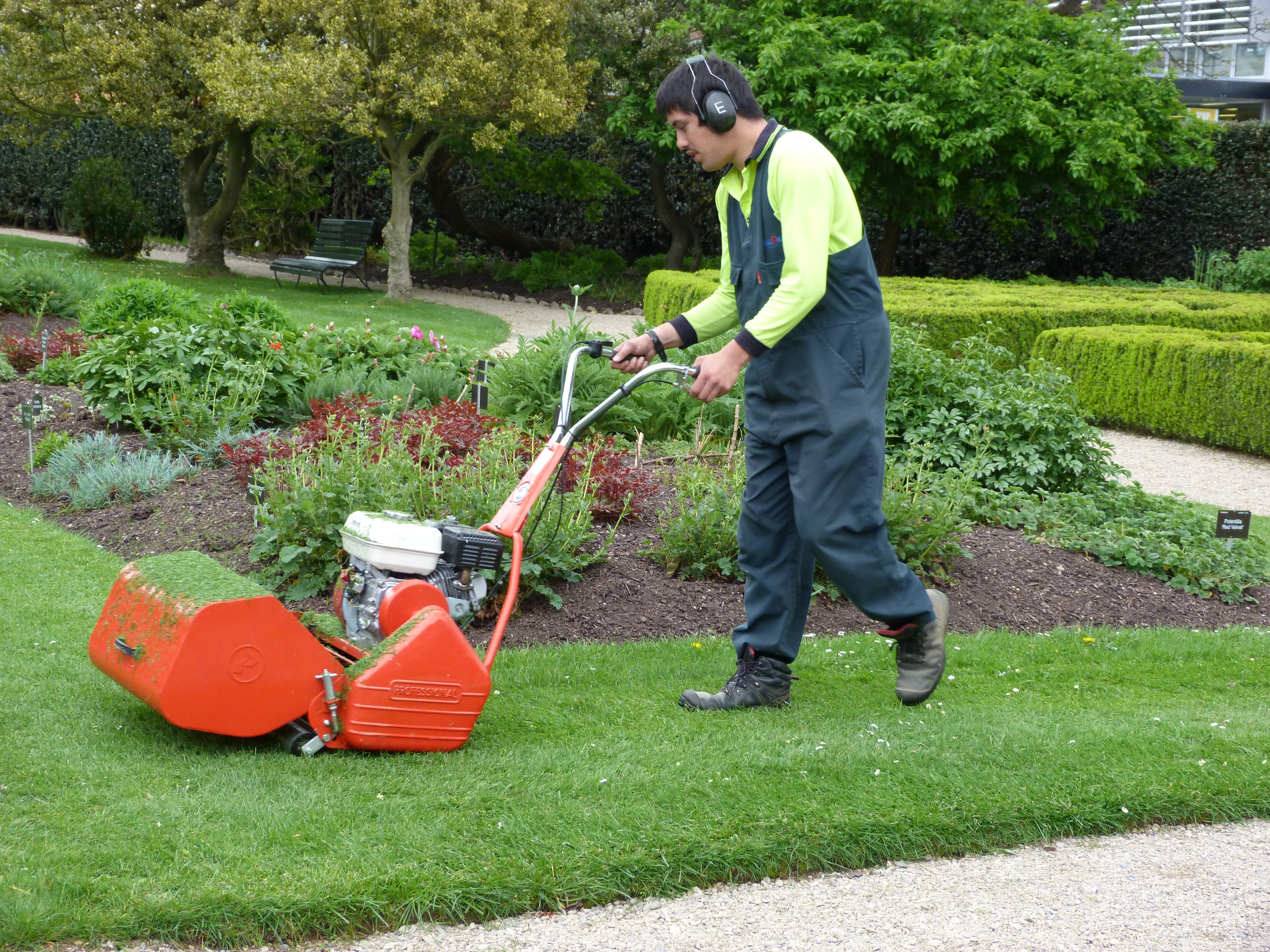 |
Malcam Trust trainee Eroni Fitiao mowing lawns.
|
IMPACTS
All staff currently working under collection curators are apprentices.
The impacts are greatest in the personal development of the trainees. Over the 6 month period this is often huge. The course produces well rounded graduates who can contribute to the local community.
Two Project Green Job graduates have been accepted onto the 3 year horticulture apprenticeship at Dunedin Botanic Garden. Other graduates have gone on to work in grounds maintenance of city parks and reserves for local contractors.
The Dunedin Botanic Garden and Dunedin City Council are also looked on as a good example of how an employer can work with a youth training organisation to achieve social as well as organisational aims and objectives. This has resulted in Malcam Trust entering into partnerships with other host companies in other industry sectors to provide similar opportunities for young people.
 |
Malcam Trust trainees Thomas Davies and Logan Heydon resurfacing paths.
|
WHAT’S NEXT?
The Garden is committed to continue running the Project Green Job in collaboration with the Malcam Trust for the foreseeable future.
PRACTITIONERS & SPONSORS
Barbara Wheeler, Collections Supervisor
Malcam Trust
Dunedin City Council
 |
 |
|
4Trades/Dunedin Botanic Garden Apprenticeship in Amenity Horticulture
Dunedin Botanic Garden’s Apprenticeship in Amenity Horticulture, with support from 4Trades, a project set up by the Malcam Trust and Dunedin City Council aims to provide a high standard of horticultural training to young people from disadvantaged backgrounds.
The botanic garden provides foundation training in horticulture skills while 4Trades employ, administer and mentor the nine apprentices per year. Apprentices work alongside collection curator staff to maintain plant collections and the propagation nursery. In addition they are provided with personal development and insight into the importance of botanic gardens and conservation, which helps to raise public awareness of global issues. This training is available to those who have graduated from the Malcam Trust's Project Green Job, which provides training to disadvantaged young people. This offers a way to continue their career development and also offers a away for these youngsters to mix with those from different backgrounds and thus integrate in society.
Started in 2003, the project is ongoing.
This video contains more information about the garden's education programme. |
ABOUT
The project offers the opportunity for young people to complete a 3 year apprenticeship in horticulture and contribute to a public garden. Since the apprentices are responsible for essential maintenance in the garden their wages are paid through the garden’s core funding, therefore there are no limitations on the project caused by funding issues. As well as practical skills, the training teaches apprentices the value of a botanic garden, how to maintain a garden in today’s changing climate and about plant conservation. This information is often passed on to their friends and family so has a wider reaching impact.
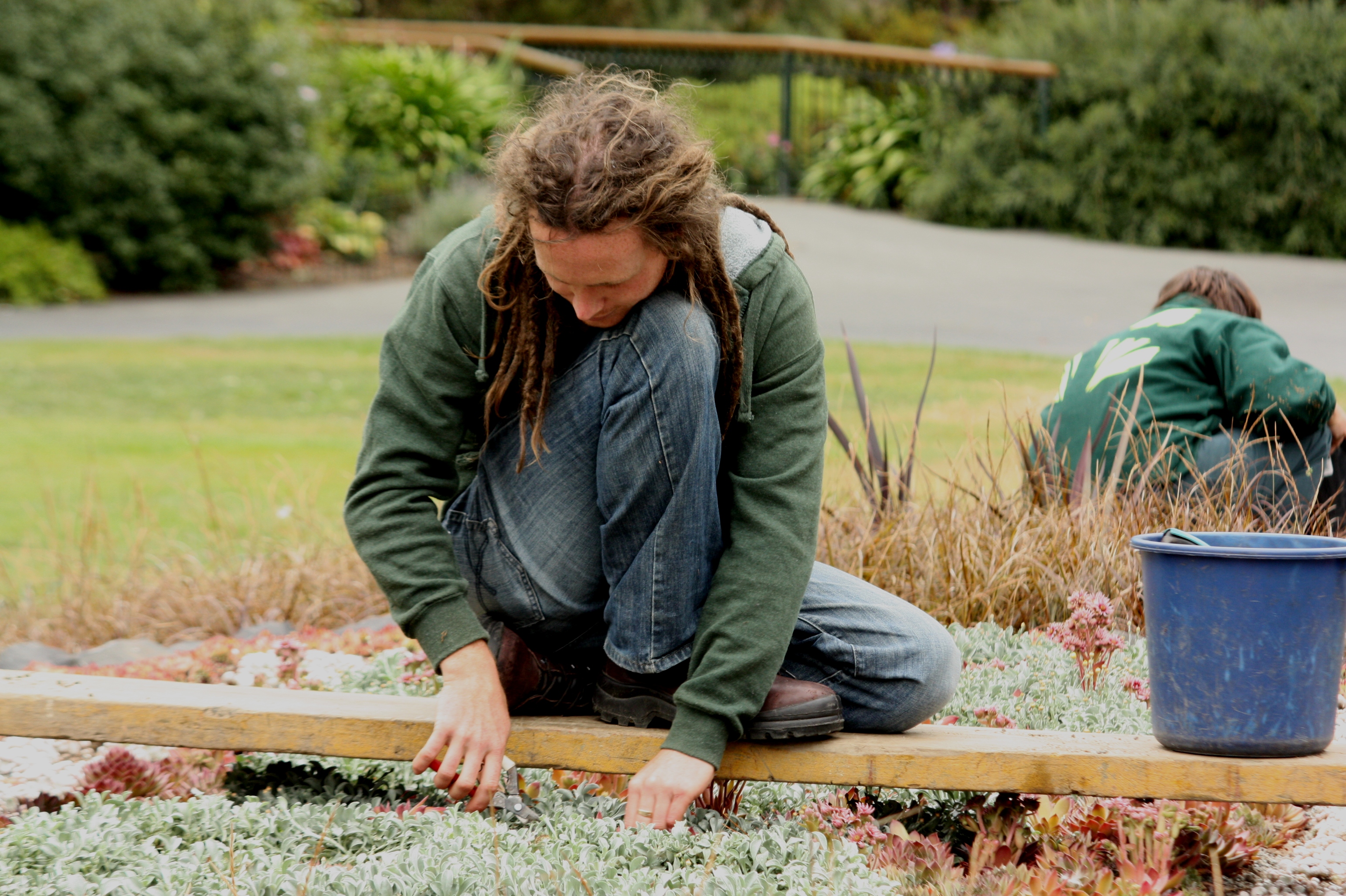 |
4Trades apprentice, Andrew Dodds, (front) and Malcam Trust trainee, Lucy Grigg, weeding carpet bedding display.
|
With 4Trades mentoring support, apprentices also undergo personal development and graduate with a better understanding of their strengths and weaknesses and an excellent grounding in all aspects of maintaining and managing plant collections.
The garden and 4Trades are closely involved as partners in the recruitment and selection process and are closely aligned with reporting and problem solving. 4Trades liaise with the training provider that delivers the theoretical unit and provides updates at regular intervals on each apprentice’s progress.
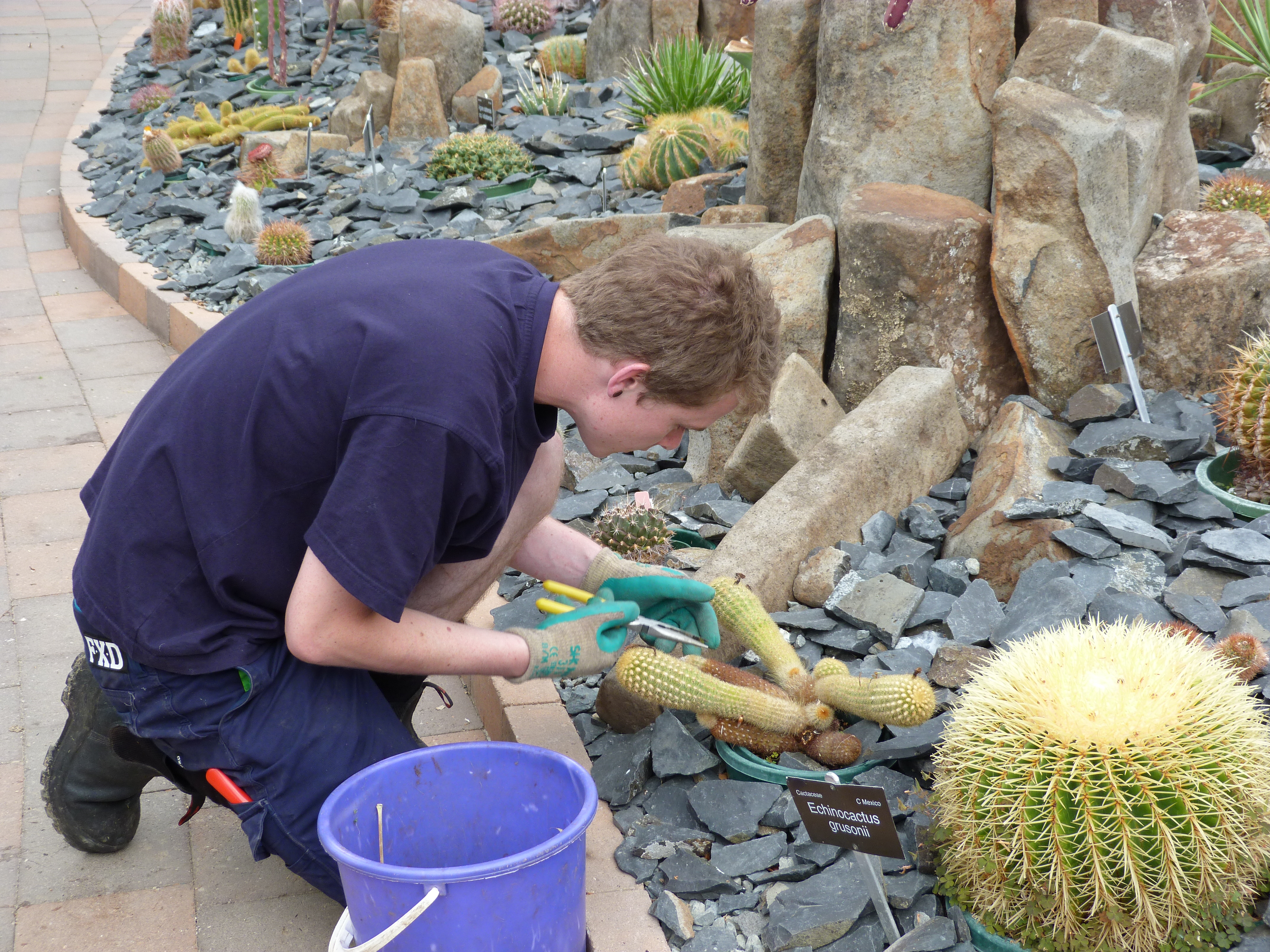 |
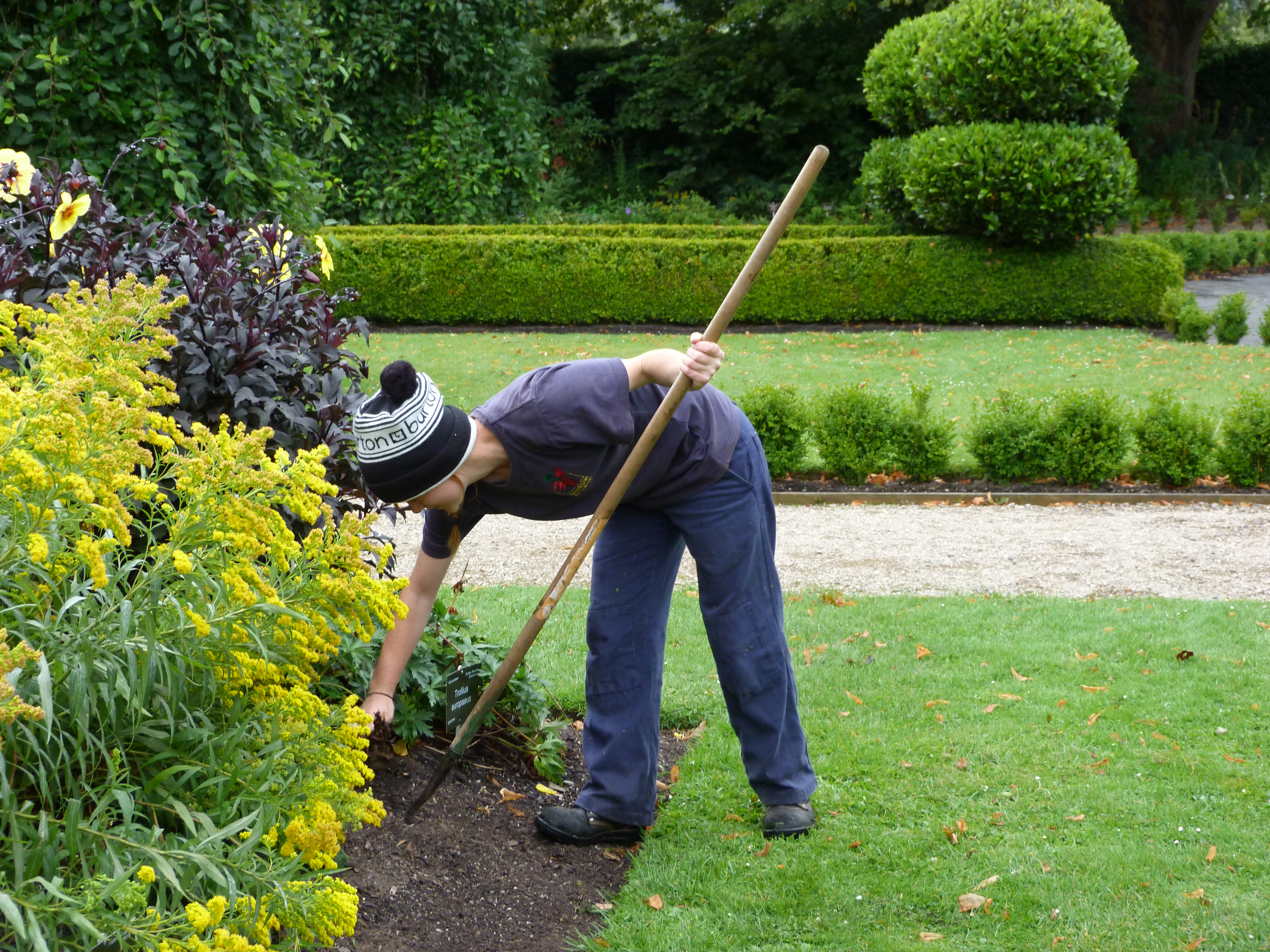 |
|
4Trades apprentice, Hayden Wright, weeding amongst cacti.
|
4Trades apprentice, Joanna Flamank, weeding beds.
|
4Trades now employs over 100 apprentices across 10 different sectors, including horticulture. This partnership is critical in allowing the garden to deliver high quality trade training for the wider industry (not just botanic gardens) and in doing so, raise standards of horticulture across all horticultural industry sectors. The strength of the partner organization and relationship between them and the garden gives the program added benefits and provides apprentices with more support than could otherwise be provided.
IMPACT
All staff currently working under collection curators are apprentices.
The impacts are greatest on the individuals in the training program as they develop both personal and practical skills.
Garden staff are also intimately involved in training which leads to a stimulating and more positive environment to work in.
In 2009 Dunedin Botanic Garden appointed a collection curator who had graduated from the apprenticeship.
Other graduates have had successes in the wider industry, with roles in maintaining and managing key reserve areas in the city and working for private contractors.
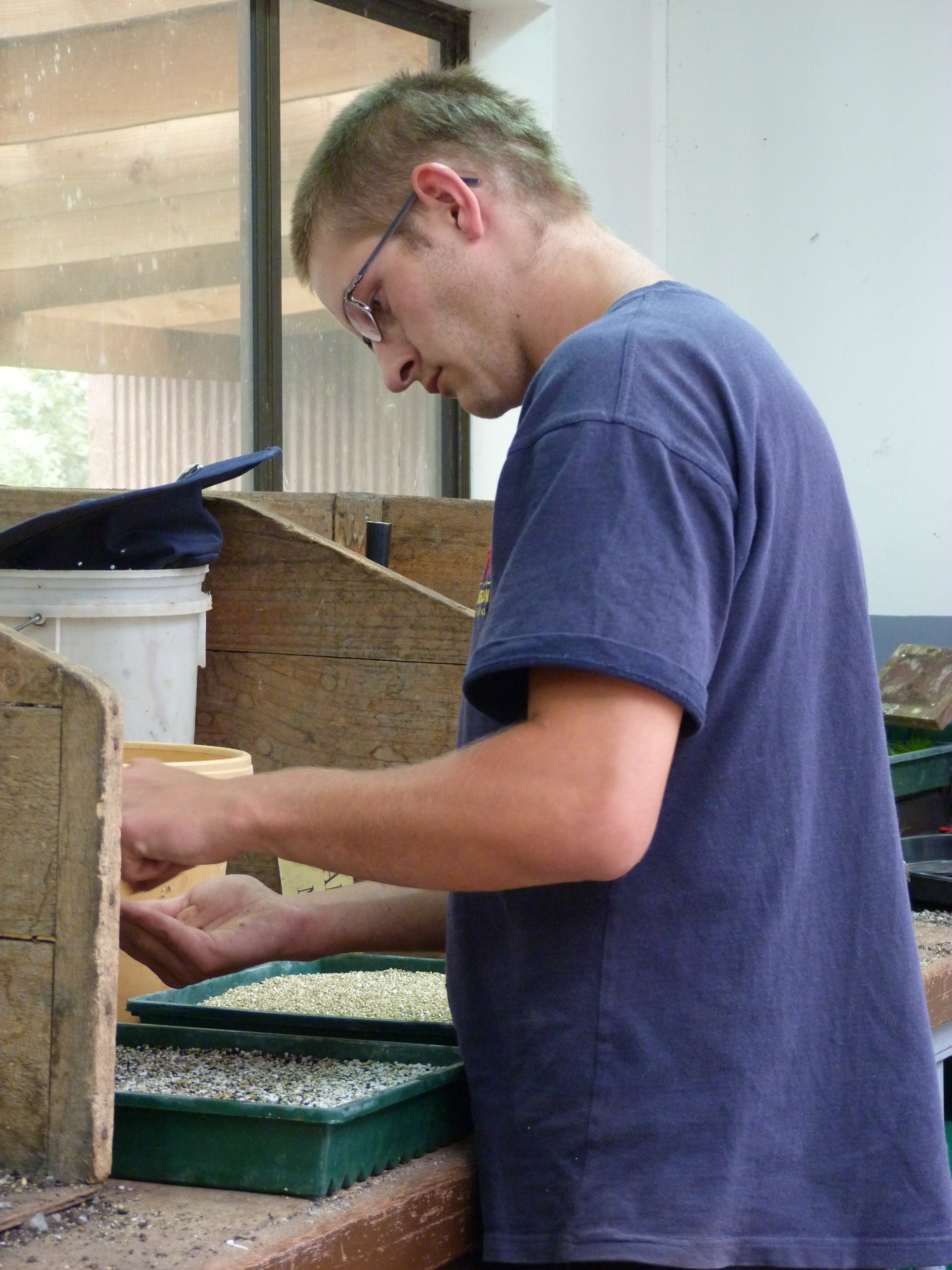 |
4Trades apprentice, Stacy Ferguson, sowing seed.
|
WHAT’S NEXT?
The garden is committed to working with 4Trades to allow the project to continue for the foreseeable future.
PRACTITIONERS & SPONSORS
Barbara Wheeler, Collections Supervisor
 |
 |
 |
 |






